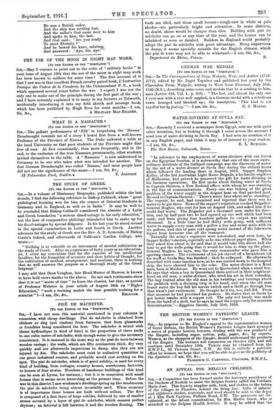THE STUDY OF GREEK.
[TO THE EDITOR OP THE " SPECTATOR."'
SIB,—In a volume of Missionary Biography, published within the last decade, I find the following reference to Bishop Caldwell, whose " great philological learning won for him the respect of Oriental Students in Germany and in England, as well as in India." It may be well to be reminded that Bishop Caldwell considered the absence of a Latin and Greek foundation "a serious disadvantage in his early education," but the love of comparative philology stimulated him to make up for his disadvantages by special diligence. In his last year he stood second in the special examination in Latin and fourth in Greek. Another advocate for the study of Greek was the Rev. A. R. Symonds, of Bishop Corrie's School, and afterwards of Sullivan's Garden College, who wrote:— " Nothing is so valuable as an instrument of mental cultivation as the study of. Greek. After an experience of forty years as an education- ist, I avow my conviction that for the exercise of the intellectual faculties, for the formation of accurate and close habits of thought, for the cultivation of method, arrangement, and analysis, there is nothing that so well answers the purpose as a thorough study of the Greek language."
I may add that Dean Vaughan, late Head-Master of Harrow, is known to have held views shnilar to the above. Do not such testimonies show that it is not " waste of time " to learn the classics, but that, as quoted of Professor Webster in your article of August 19th on "Higher Education," "such a training makes the best possible training for a






























 Previous page
Previous page